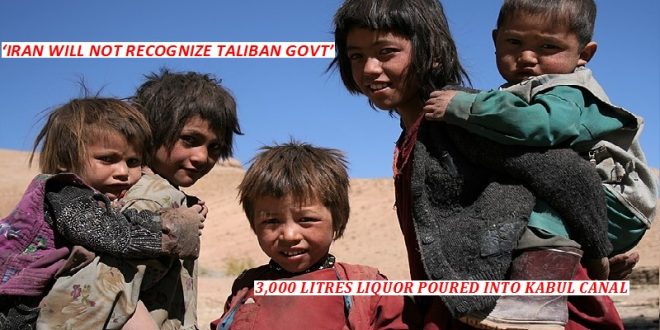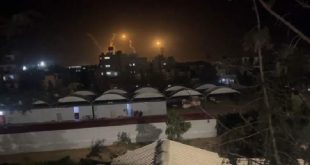03-01-2022
By SJA Jafri + Bureau Report
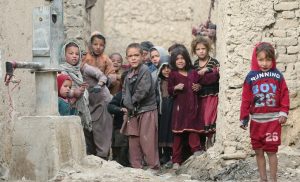 KABUL/ ISLAMABAD: Over 28,000 children have been killed in conflicts since 2005 in Afghanistan, the United Nations Children’s Fund (UNICEF) said on Friday in a press release.
KABUL/ ISLAMABAD: Over 28,000 children have been killed in conflicts since 2005 in Afghanistan, the United Nations Children’s Fund (UNICEF) said on Friday in a press release.
According to UNICEF, Afghanistan has the highest number of verified child casualties since 2005: “Afghanistan, for example, has the highest number of verified child casualties since 2005, at more than 28,500, accounting for 27 percent of all verified child casualties globally,” the press release reads.
Afghanistan, Yemen, Syria and northern Ethiopia are the places where children have paid a devastating price as armed conflict, inter-communal violence and insecurity continued, UNICEF said.
“Year after year, parties to conflict continue to demonstrate a dreadful disregard for the rights and wellbeing of children,” said UNICEF Executive Director Henrietta Fore. “Children are suffering, and children are dying because of this callousness. Every effort should be made to keep these children safe from harm.”
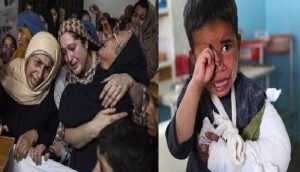 According to the statement, the UN has verified 266,000 cases of grave violations against children in more than 30 conflict situations across Africa, Asia, the Middle East and Latin America over the past 16 years. The statement says these are only the cases verified by UN-led monitoring and reporting mechanisms, meaning that the true figures may be far higher.
According to the statement, the UN has verified 266,000 cases of grave violations against children in more than 30 conflict situations across Africa, Asia, the Middle East and Latin America over the past 16 years. The statement says these are only the cases verified by UN-led monitoring and reporting mechanisms, meaning that the true figures may be far higher.
UNICEF says that so far there is no data available about grave violations against children in 2021, but in 2020, 26,425 grave violations against children were verified by the UN.
UNICEF has called on “all parties to conflict” to take concrete measures to protect children.
“Ultimately, children living through war will only be safe when parties to conflict take concrete action to protect them and stop committing grave violations,” said Fore. “As we approach the end of 2021, I call on all parties to conflict to end attacks against children, uphold their rights and strive for peaceful political resolutions to war.”
Meanwhile, the Associated Press reported that in western Afghanistan a father sold his 10-year-old daughter into marriage without telling her mother to feed his five-member family.
 Aziz Gul, the girl’s mother, described her despair at learning the news: “My heart stopped beating. I wished I could have died at that time, but maybe God didn’t want me to die.”
Aziz Gul, the girl’s mother, described her despair at learning the news: “My heart stopped beating. I wished I could have died at that time, but maybe God didn’t want me to die.”
Gul rallied her brother and village elders and with their help secured a “divorce” for Qandi, on condition she repays the 100,000 Afghanis (about $1,000) her husband received, sources reported.
Meanwhile, a team of Afghan intelligence agents poured around 3,000 litres of liquor into a canal in Kabul, the country’s spy agency said on Sunday, as the new Taliban authorities crack down on the sale of alcohol.
Video footage released by the General Directorate of Intelligence (GDI) showed its agents pouring alcohol stored in barrels into the canal after seizing it during a raid in the capital.
“Muslims have to seriously abstain from making and delivering alcohol,” an intelligence official said in the footage the agency posted on Twitter on Sunday.
It was not clear when the raid was carried out or exactly when the alcohol was destroyed, but a statement issued by the agency said three dealers were arrested during the operation.
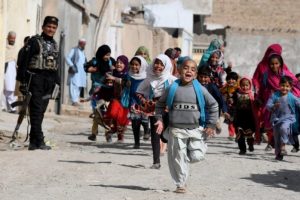 Selling and consuming alcohol was banned even under the previous Western-backed regime, but the Taliban, known for their austere brand of Islam, are stricter in their opposition to it.
Selling and consuming alcohol was banned even under the previous Western-backed regime, but the Taliban, known for their austere brand of Islam, are stricter in their opposition to it.
Earlier, Iran’s ambassador in Kabul said that his country will not recognize the current Afghan government unless its government is inclusive.
He made the remarks in a special interview with TOLOnews’ Bahram Aman in Kabul.
Ambassador Bahadur Aminian said that Tehran might persuade other countries to recognize the Afghan government if the Islamic Emirate brings reforms to its government structure.
“If a group comes (to power) and the group is (comprised) of a single ethnic group and all other ethnic groups are not included in the government, we don’t accept it, and, therefore, we benevolently call on the Taliban rulers to form an inclusive government,” he said but the Islamic Emirate said Aminian’s remarks are an attempt to interfere in Afghan affairs.
“Is the government or the cabinet of Iran based on other people’s definition of inclusive?” said Inamullah Samangani, deputy spokesman for the Islamic Emirate. “Every country has their own definition of inclusive government based on their national interests.”
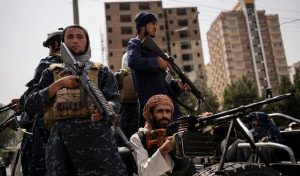 “This government should be inclusive based on the Afghan nation’s wishes, not based on foreign countries’ interference,” said Sayed Javad Husseini, leader of Hezb-e-Adalat wa Tawsa.
“This government should be inclusive based on the Afghan nation’s wishes, not based on foreign countries’ interference,” said Sayed Javad Husseini, leader of Hezb-e-Adalat wa Tawsa.
The Iranian ambassador said that the current economic crisis will pave the way for extremism, particularly for Daesh.
“If the economic problems remain, it will cause more migration. If the economic problems remain, they will cause extremism, which will not only threaten Afghanistan but also the region,” he said.
Aminian, however, denied reports that Iranian forces were treating Afghan refugees violently, saying that approximately four million Afghans are settled in Iran.
Iran’s government provided educational opportunities for the Afghan refugees, he said.
Aminian is optimistic over the US withdrawal of Afghanistan and says that Tehran considers it part of its revenge against Washington for the killing of Qasem Soleimani, a senior Iranian military official, who was killed by a US drone strike in January 2020 in Iraq.
 Pressmediaofindia
Pressmediaofindia
